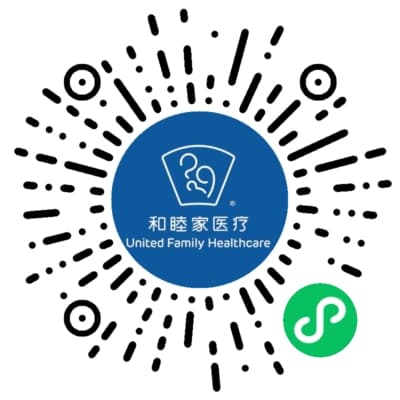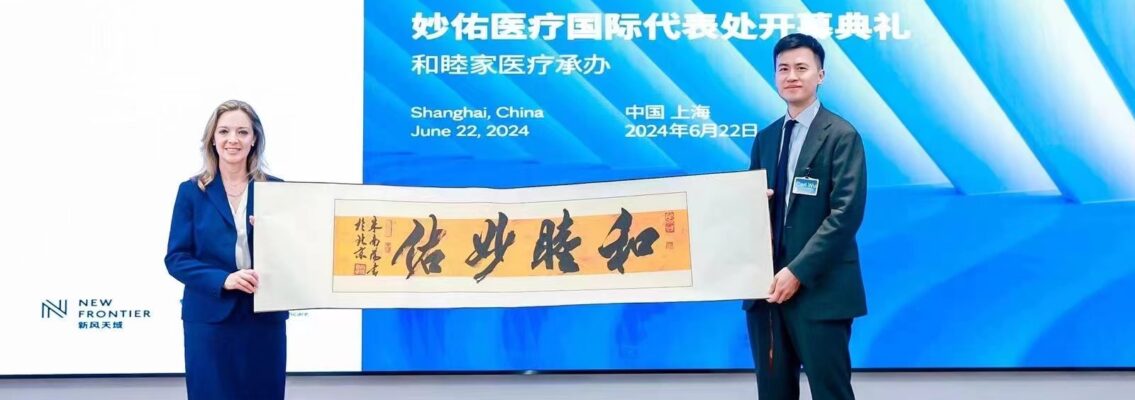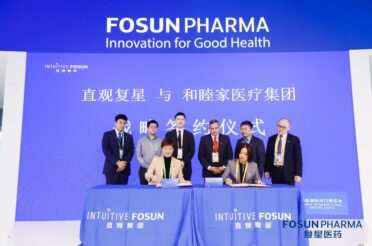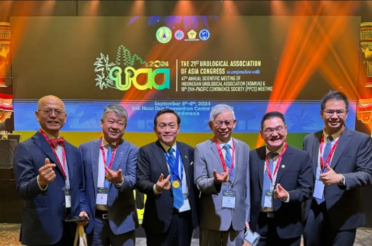On June 22, 2024, Mayo Clinic officially announced the launch of its first International Representative Office (IRO) in China, at a Shanghai United Family Hospital. Also, New Frontier announced the initiation of its International Medical Center to provide foreign and local patients integrated medical care services.
New Frontier and United Family Healthcare (UFH) plan to continue cooperating with Mayo Clinic in the areas of treatment, international academic exchange, clinical training, and clinical pharmaceutical R&D, working hard to link globally cutting-edge treatment resources for the benefit of patients.
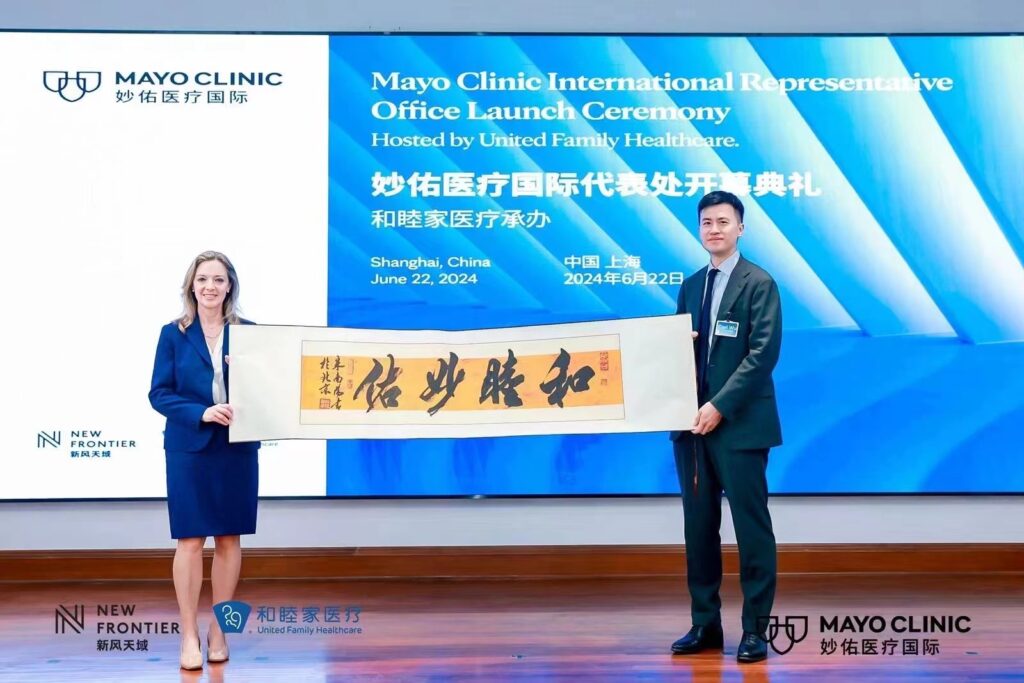
Stacey Rizza (left), Executive Medical Director for International Practice in Asia Pacific at Mayo Clinic, and Carl Wu (right), co-founder and CEO at New Frontier and CEO at UFH.
Carl Wu, New Frontier co-founder/CEO and UFH CEO, stated, “Since its founding, UFH has held to being patient-centered and thus worked hard to provide high-quality medical services that incorporate globally cutting-edge experience. Establishing this partnership today in the century-old Henry Lester Institute of Medical Research and Preventive Medicine (now the New Frontier Innovative Research Center) with Mayo Clinic is both an attempt at a new overseas collaboration model and a continuation of the historical spirit of international cooperation.”
The Mayo Clinic IRO is located in Building 1 of the United Family Hospital in Jing’an District, Shanghai (originally the Henry Lester Institute of Medical Research and Preventive Medicine). Shanghai UFH’s three-hospital system will better empower the development of the Mayo Clinic IRO.
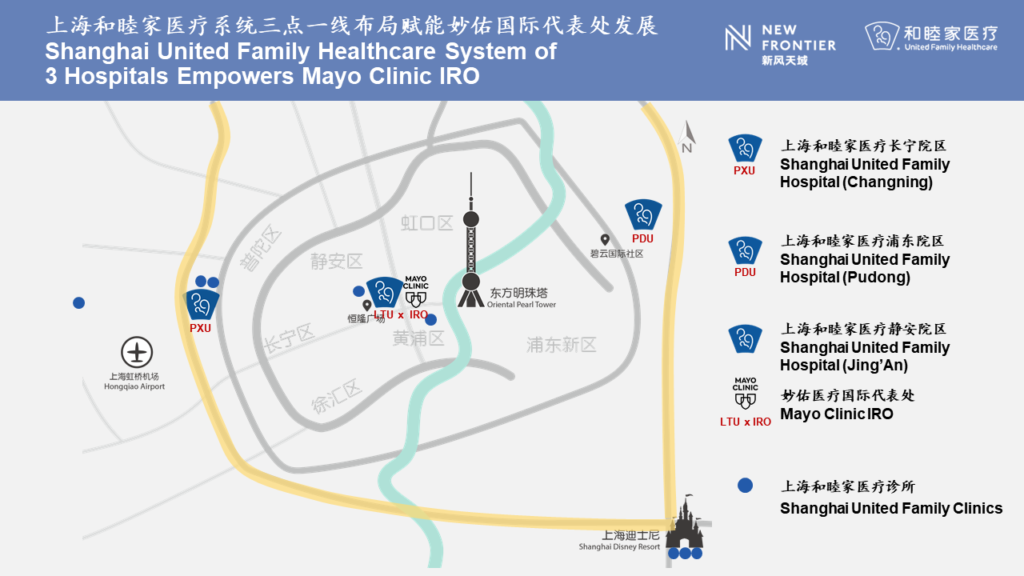
Wu continued, “With the Mayo Clinic IRO at the Shanghai United Family Hospital, medical experts from UFH and Mayo Clinic will work together to provide patients with comprehensive care/case management and boost accessibility to globally cutting-edge diagnosis and treatment technology.”
This joint treatment model with Mayo Clinic is a new bid by New Frontier/UFH at linking global resources. The two will take the lead in collaboration in the fields of emergency and critical care to provide high-quality medical treatment in such areas as oncology, cardiology, neurology, organ transplants, diabetes, endocrinology, gastroenterology, and pulmonology.
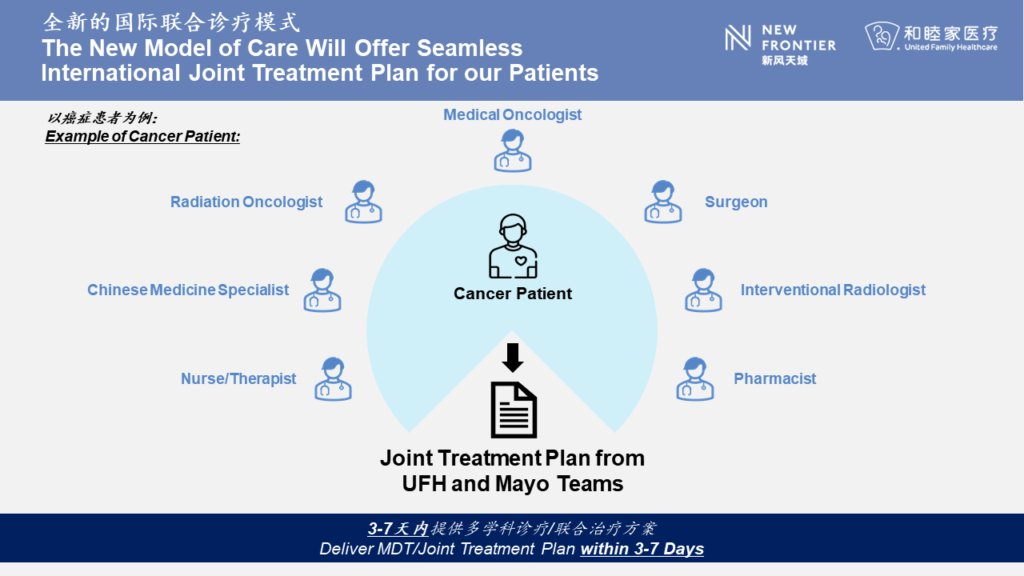
With the development of precision and personalized medical care, malignant tumor treatment has entered a completely new era. China’s five-year overall survival rate grew from 30.9% (2003-2005) to 40.5% (2012-2015),[1] a direct result of China’s rapid development in cancer diagnosis and treatment in recent years.
Wu further stated, “We have noticed patients’ ever-increasing need for innovative medical services and cutting-edge cancer treatments. We look forward to working closely with Mayo Clinic, engaging in academic exploration with local and overseas experts to provide patients with diagnostic and treatment technology at the global forefront.”
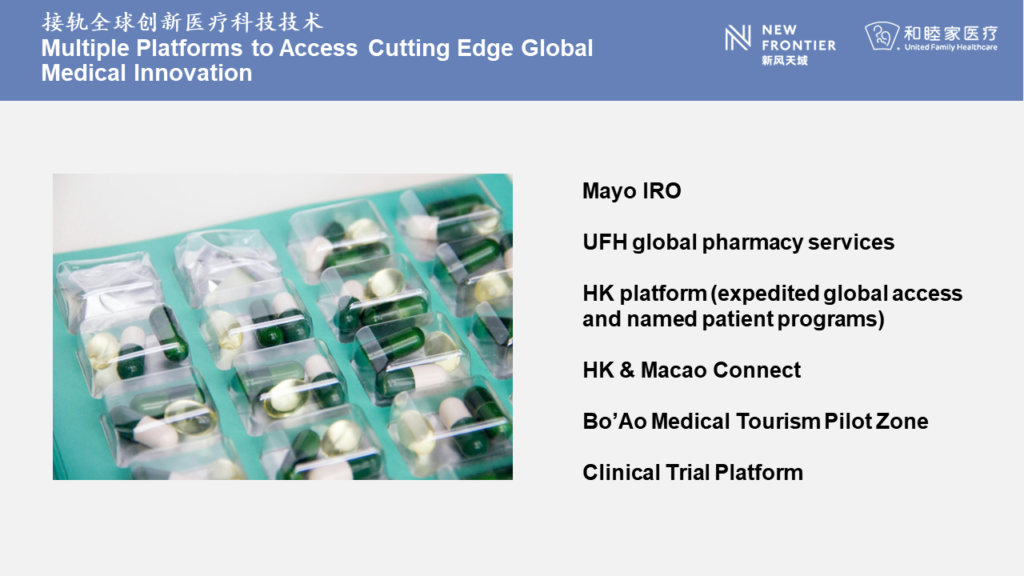
In addition, as Shanghai is an international metropolis full of culture from around the world, numerous people from abroad are drawn to travel, work, invest, and live there, and with its abundance of medical resources, it is working hard to become a major medical center in Asia. Guided by the city authority’s strategy of development, New Frontier/UFH will continue to explore and promote advanced services in Shanghai to offer high-quality care to patients from around the world and turn Shanghai into a major medical tourism destination.
Connected with globally innovative medical technology, New Frontier/UFH’s subsidiaries Beijing United Family New Hope Oncology Center, Bo’ao United Family Medical Center, HEAL Oncology (Hong Kong), and Hong Kong Integrated Oncology Centre are working together to provide patients with access to globally innovative drugs, diagnostic/treatment technology, and treatment plans. Today’s initiation of cooperation with Mayo Clinic is a step in offering patients more choices in international medical care.
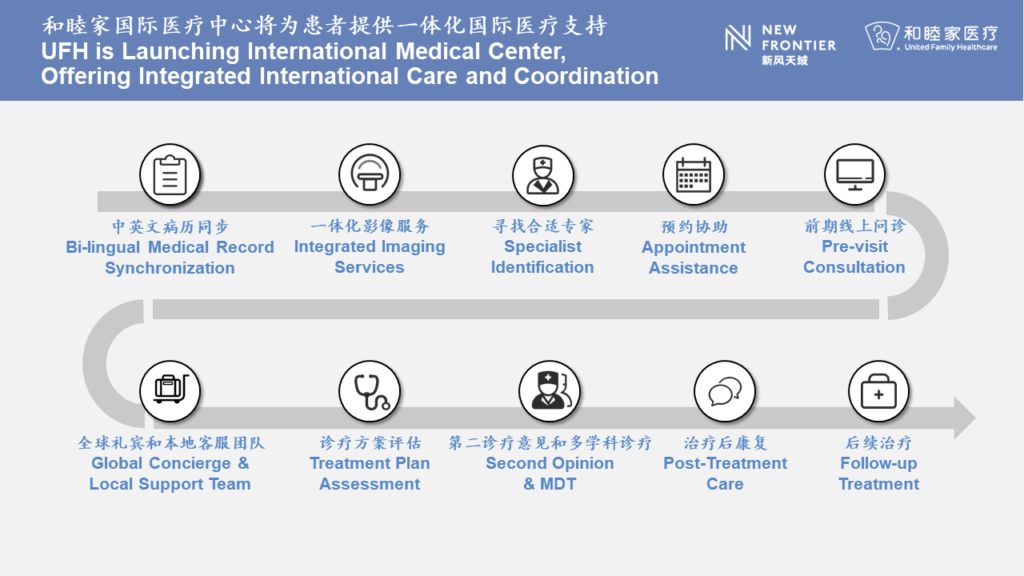
On the same day at the New Frontier Innovative Research Center, the “Beyond Horizon: Patient Healthcare Conference,” themed on international personalized tumor treatment, was held, focusing on new advances in thoracic, breast, and hematologic tumor treatment. Experts from UFH, Mayo Clinic, Peking University People’s Hospital, Xuanwu Hospital at Capital Medical University, Ruijin Hospital at Shanghai Jiao Tong University, Shanghai Chest Hospital, People’s Liberation Army General Hospital, Queen Mary Hospital (Hong Kong), and the Hong Kong Children’s Hospital discussed the latest forms of tumor treatment.
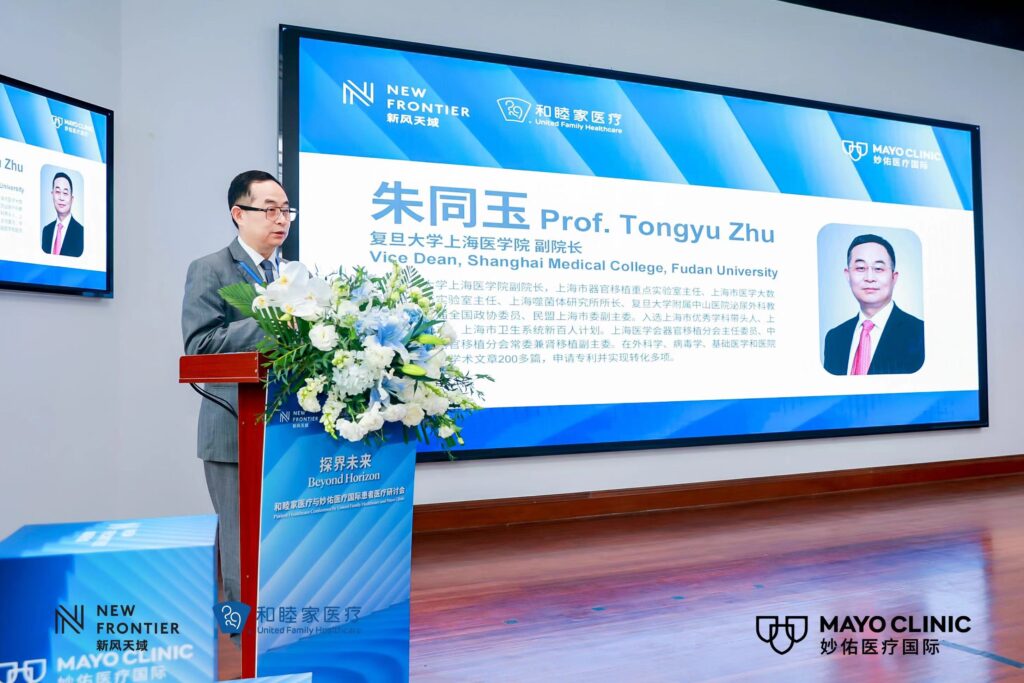
Vice President Zhu Tongyu of Shanghai Medical College at Fudan University gave an opening address.
According to China’s National Cancer Center, there were 4.8247 million new cancer cases in 2022, or an average of 341.75 for every 100,000 people.[2] Due to the aging population, the top five forms of cancer that led to death were lung, gastric, esophageal, liver, and colorectal cancer.[3]
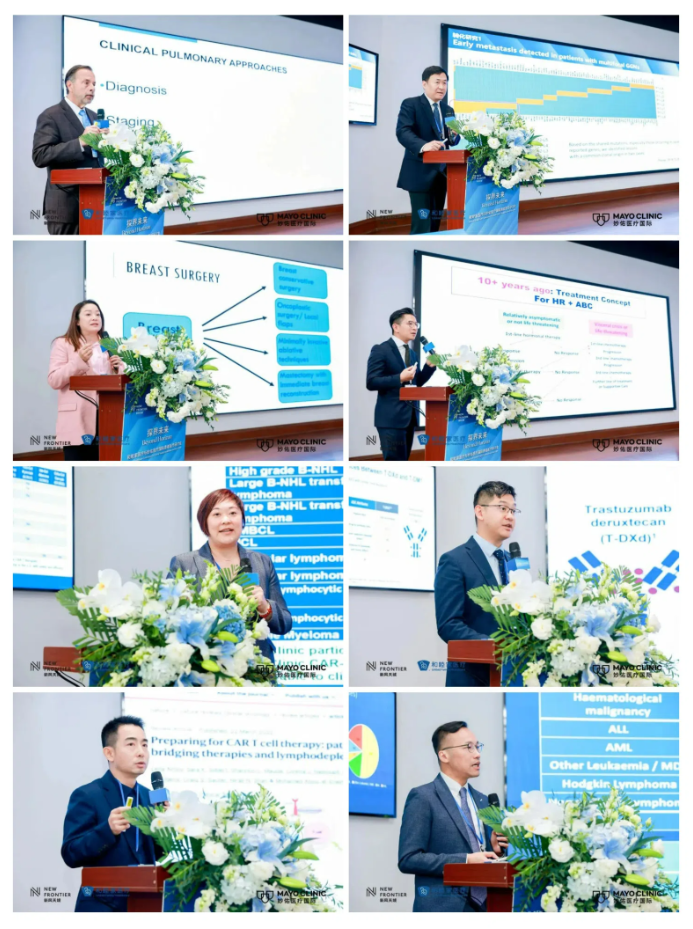
Experts came together at the New Frontier Innovative Research Center and discussed the latest forms of cancer treatment.
China has the largest population of seniors in the world.[4] In 2019, there were 254 million people aged 60+, and by 2040, that figure is expected to rise to 402 million, accounting for 28%[5] of the population. The aging population is greatly contributing to the burden of cancer.
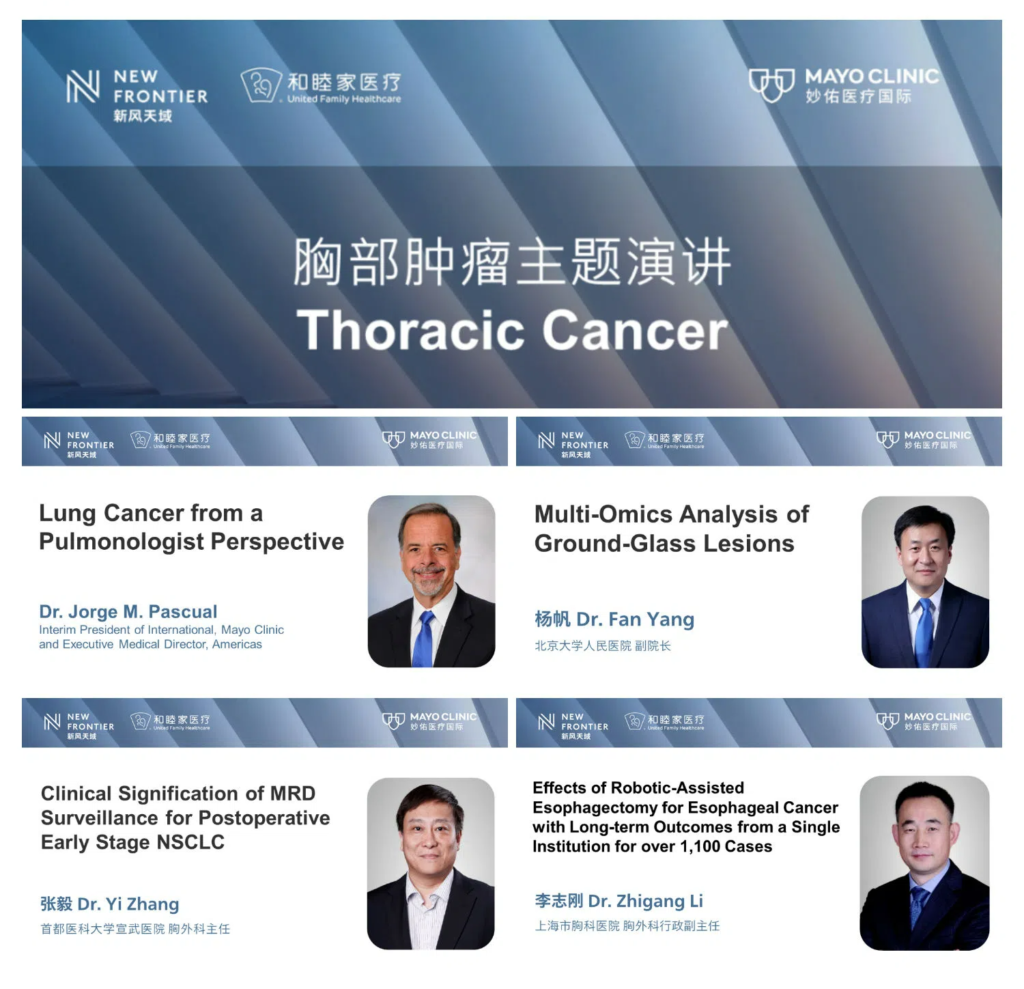
Keynote speakers on thoracic cancer: Jorge M. Pascual, Interim President of International, Mayo Clinic and Executive Medical Director, Americas; Yang Fan, Vice President, Peking University People’s Hospital; Zhang Yi, Director, Department of Thoracic Surgery at Xuanwu Hospital; and Li Zhigang, Deputy Director, Department of Thoracic Surgery at Shanghai Chest Hospital.
New Frontier/UFH is working to help promote a healthy aging population. Recently, New Frontier announced its acquisition of the Hong Kong Integrated Oncology Centre, and since then, the New Frontier/UFH conglomerate has brought over 20% of Hong Kong’s full-time private oncology physicians under its wing, the first in terms of scale for UFH, which has a unique nationwide, multidisciplinary cancer treatment network.
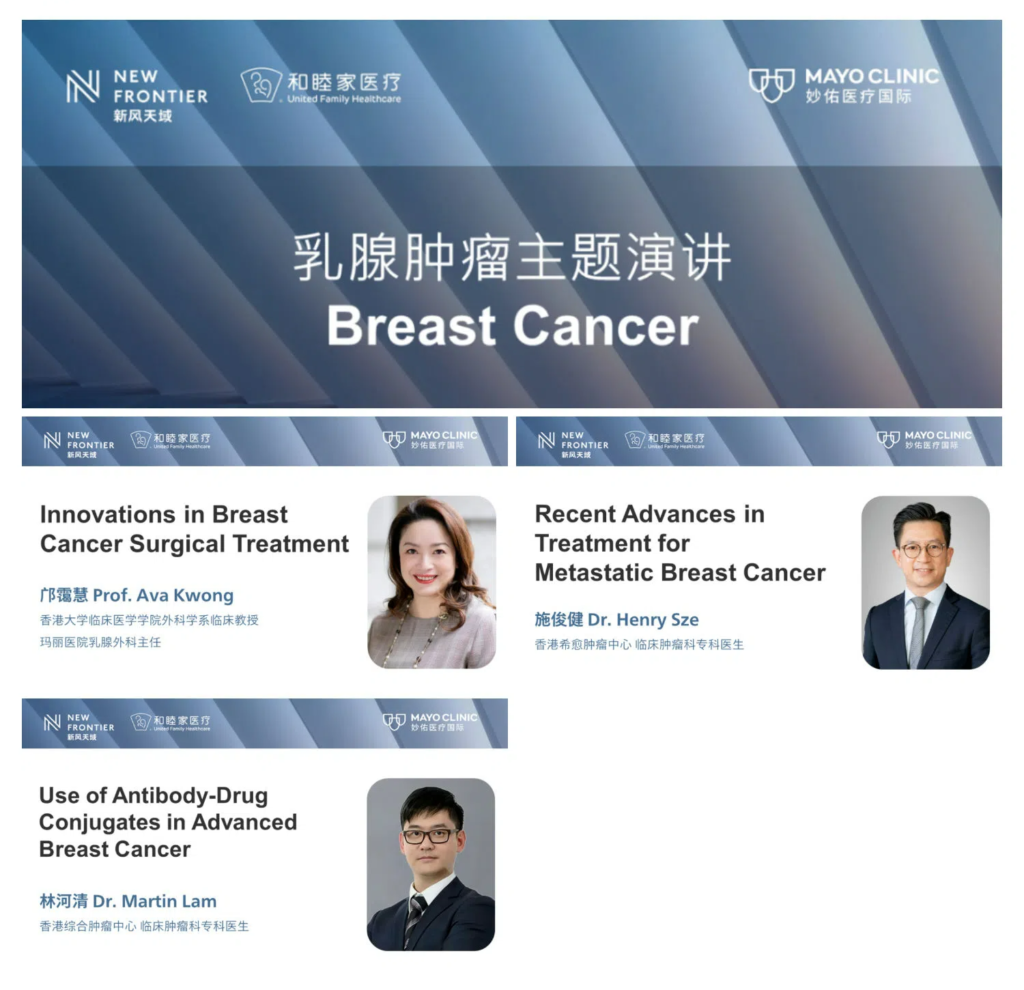
Keynote speakers on breast cancer: Ava Kwong, clinical professor, Department of Surgery, School of Clinical Medicine at the University of Hong Kong, and Chief, Division of Breast Surgery at Queen Mary Hospital; Henry Sze, clinical oncologist at HEAL Oncology; and Martin Lam, clinical oncologist at the Hong Kong Integrated Oncology Centre.
Creating a platform for high-quality cancer management and driving clinical cancer research and treatment have always been major strategies at New Frontier/UFH.
UFH will focus on thoracic and breast cancer and develop such new technologies as early-diagnosis methods, minimally invasive treatment, and precision treatment in a multidisciplinary mode that integrates cancer, surgery, Western medicine, traditional Chinese medicine, intervention, pathology, and imaging. In addition, with New Frontier/UFH’s nationwide medical care system and resources, we will continue spreading advanced medical concepts and add to the quantity of our exceptional medical resources.
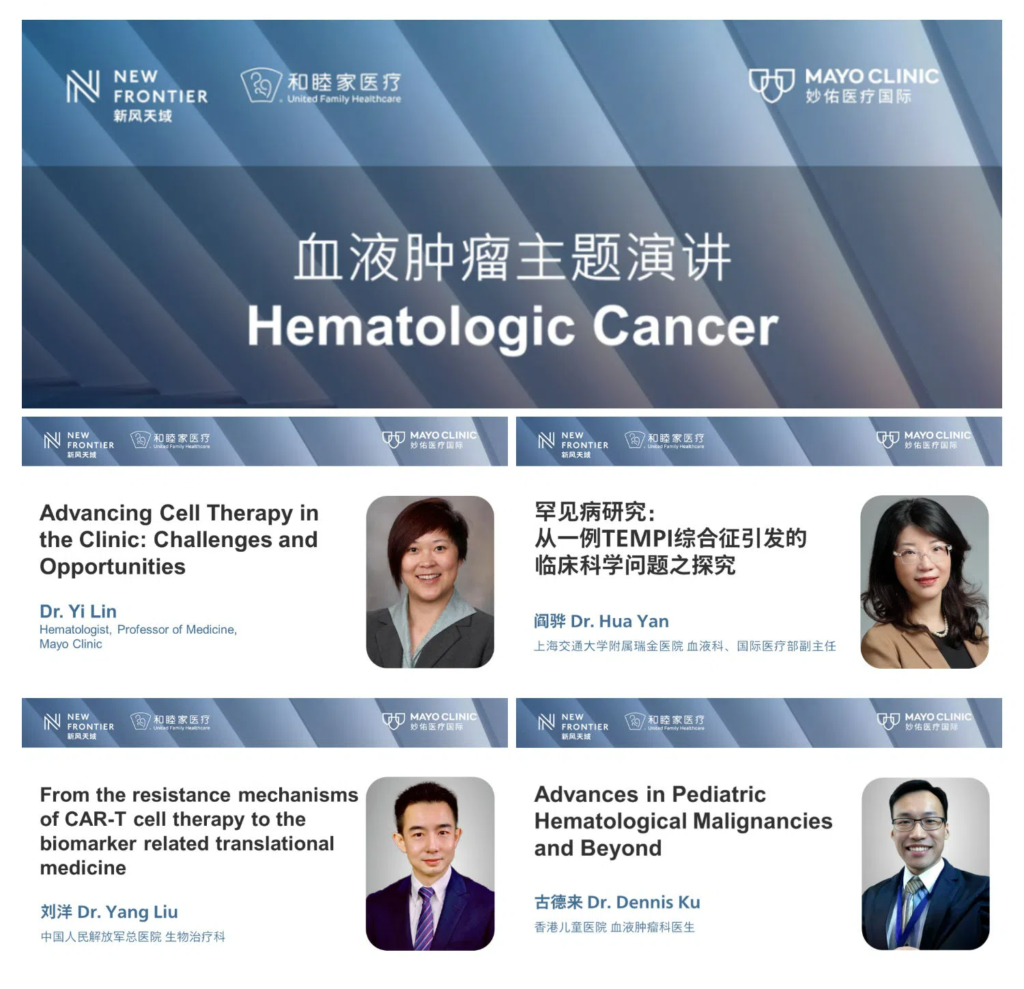
Keynote speakers on hematologic cancer: Lin Yi, clinical hematologist, Mayo Clinic; Yan Hua, Department of Hematology, and Deputy Director, Department of International Treatment, Ruijin Hospital at Shanghai Jiao Tong University; Liu Yang, Department of Biotherapy, People’s Liberation Army General Hospital; and Dennis Ku, Department of Hematology and Oncology, Hong Kong Children’s Hospital.
In today’s globalized world, all kinds of medical care, including in oncology, will benefit from international collaboration. With our patient-centered service philosophy, UFH is continually exploring and driving the development of the new. We are confident that with more and more international exchange and cooperation, we will be able to provide patients with more diversified, internationalized healthcare choices.
–
References:
[1] Maomao C., He L., Dianqin S., et al. Current cancer burden in China: Epidemiology, etiology, and prevention. Cancer Biol Med. 2022;19 (8): 1121-1138. doi:10.20892/j.issn.2095-3941.2022.0231
[2] Rongshou D., Ru C., Bingfeng H., et al. Analysis of cancer epidemiology in China in 2022. Chinese Journal of Oncology. 2024; 46 (3): 221-231.
doi: 10.3760/cma.j.cn112152-20240119-00035
[3] Changfa X., Wanqing C. Analysis of the proportion and trend of the burden of cancer attributed to population aging in China. Chinese Journal of Oncology. 2022, 44 (1): 79-85.
doi:10.3760/cma.j.cn112152-20211012-00756.
[4] The Lancet. Population aging in China: Crisis or opportunity? Lancet. 2022; 400 (10366): 1821.
doi:10.1016/S0140-6736(22)02410-2





